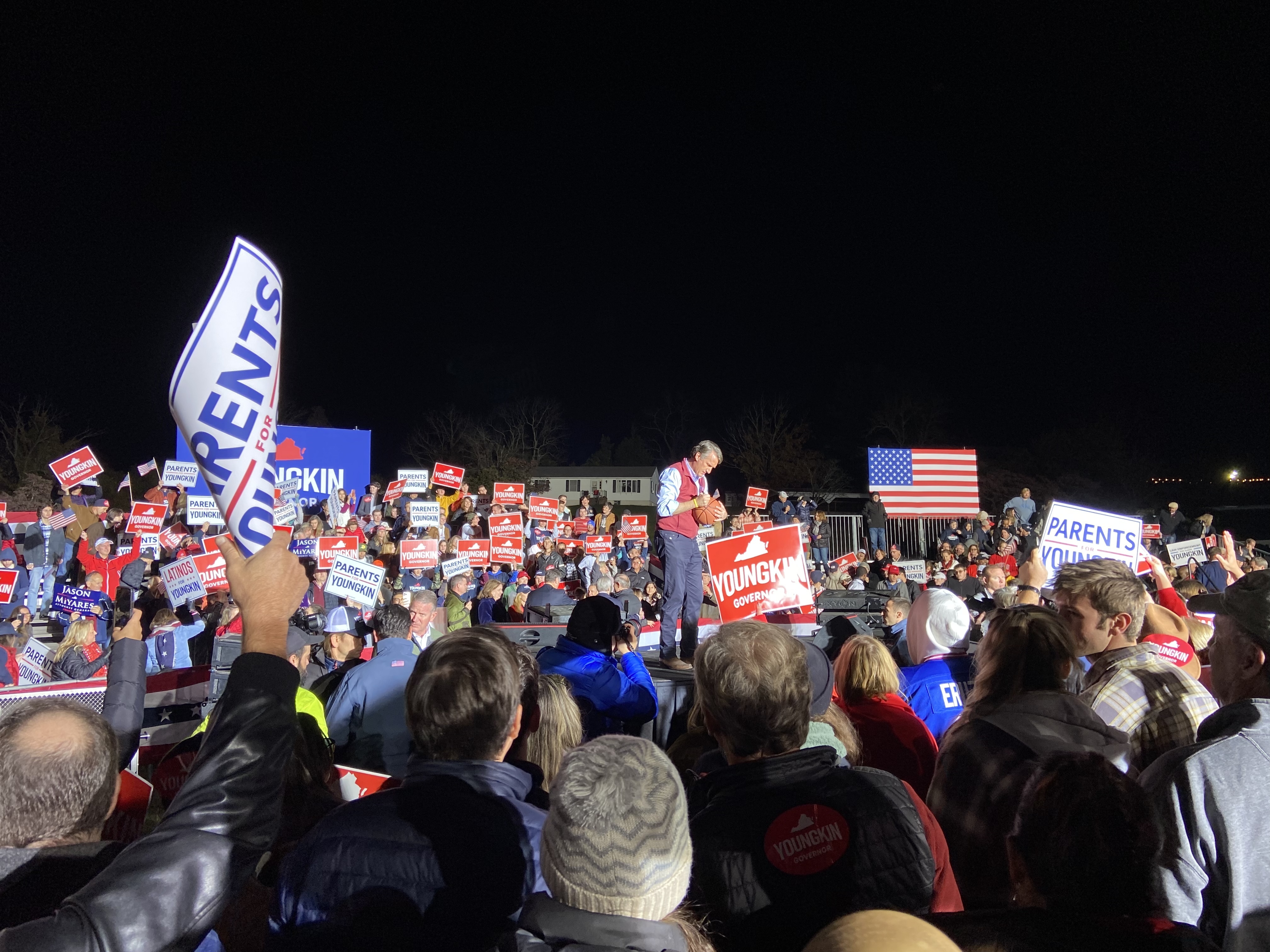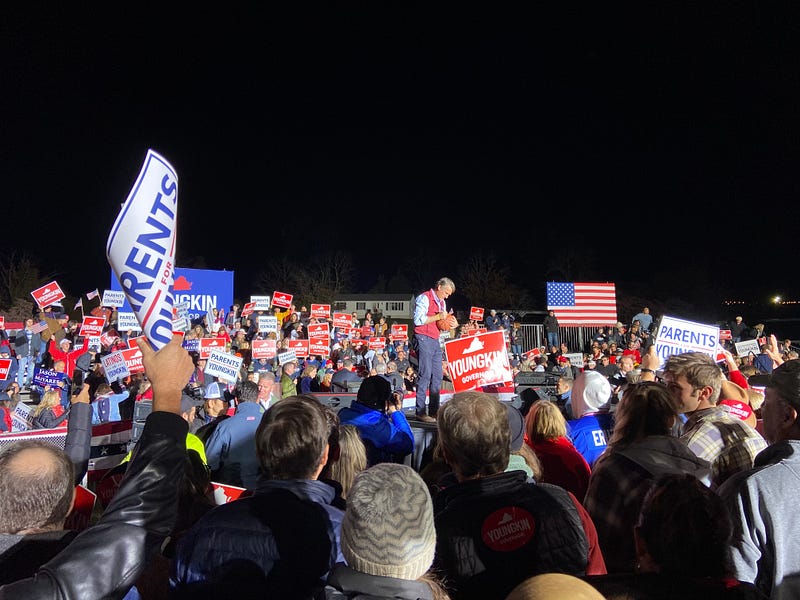Happy Wednesday! Last night, an underdog from the South that analysts all but wrote off over the summer rallied to defeat the winner from a few years ago—all while keeping the fan favorite on the sidelines. Congratulations to the Atlanta Braves on winning the World Series!
P.S. It should be illegal for Game 6 of the World Series to fall on Election Night.
Quick Hits: Today’s Top Stories
-
Centers for Disease Control Director Dr. Rochelle Walensky on Tuesday formally endorsed the CDC Advisory Committee on Immunization Practices’s recommendation that children ages 5 to 11 receive Pfizer-BioNTech’s pediatric COVID-19 vaccine. The move paves the way for children to begin receiving shots as soon as today.
-
News outlets officially projected Tuesday night that Republican Glenn Youngkin will defeat Democrat Terry McAuliffe in the race to become Virginia’s next governor. Youngkin declared victory last night, but McAuliffe has yet to concede. Republicans Winsome Sears and Jason Miyares are also projected to win the state’s lieutenant governor and attorney general races, respectively.
-
New Jersey’s gubernatorial race between incumbent Democrat Phil Murphy and Republican challenger Jack Ciattarelli remained too close to call as of Wednesday morning, with Ciattarelli leading Murphy by roughly 1,200 votes with 88 percent of the vote counted. Per NJ.com, many of the outstanding votes are in heavily Democratic precincts.
-
Democrat Eric Adams is projected to win New York City’s mayoral race easily over Republican Curtis Sliwa, while Byron Brown—Buffalo’s incumbent mayor who mounted a longshot write-in campaign after losing in the Democratic primary—appears poised to defeat self-declared socialist India Walton and secure a fifth consecutive term. Democrat Michelle Wu was projected the winner of Boston’s mayoral race, and incumbent Jacob Frey is leading in the Minneapolis mayoral race after the first round of ranked-choice voting. Minneapolis voters also rejected a ballot initiative that would have replaced the city’s police force with a new Department of Public Safety.
-
Ethiopia’s Council of Ministers declared a state of national emergency on Tuesday as the country’s civil war escalates and the Tigray People’s Liberation Front closes in on the capital city of Addis Ababa. U.S. Trade Representative Katherine Tai announced yesterday the United States will suspend duty-free access to Ethiopian exports effective January 1, 2022, due to the “gross violations of internationally recognized human rights” occurring in the country’s northern region.
-
An attack on Kabul’s Sardar Mohammad Daud Khan military hospital on Tuesday killed at least 25 people—including a senior Taliban military leader—and wounded more than a dozen others. ISIS-K took responsibility for the attack, which included multiple suicide bombings and what one doctor in the hospital described as gunmen walking through a hospital ward and shooting wounded Taliban fighters in the head.
Youngkin Triumphs in Virginia

With Democratic Gov. Ralph Northam term-limited out, Virginia was always going to have a new governor come January 2022. Last night, we finally found out who it’ll be, as Republican Glenn Youngkin defeated Democrat Terry McAuliffe on Tuesday in the highest-profile election of 2021.
McAuliffe—seeking to reclaim the post he held from 2014 to 2018—led Youngkin in public polling throughout the summer, at times by as many as 8 percentage points. But the former private equity executive surged in the final days of the campaign, and Youngkin’s momentum carried him to—as of early Wednesday morning—somewhere between a 2- and 3-point victory on a cold and rainy day in the Old Dominion. Although the television networks took hours to call the race, Decision Desk HQ and Dave Wasserman of the Cook Political Report declared Youngkin the winner approximately 90 minutes after the polls closed.
“My fellow Virginians, we stand here this morning at this defining moment,” Youngkin told a crowd of supporters in a 1 a.m. speech declaring victory. “Let’s reinvigorate this amazing commonwealth of Virginia. Together, we can build a new day.” McAuliffe spoke earlier in the evening, but did not concede.
Although still considered a swing state by some, Virginia had been trending blue for more than a decade. Its electoral votes last went to a GOP presidential candidate in 2004, and no Republican had been elected to statewide office since 2009. McAuliffe defeated Republican Ken Cuccinelli in the 2013 gubernatorial race by slightly less than 3 percentage points, and Democrat Ralph Northam trounced Republican Ed Gillespie by 9 four years later. Tuesday reversed that trend: Not only did Youngkin emerge victorious, but Republicans Winsome Sears (lieutenant governor) and Jason Miyares (attorney general) did as well.
“Glenn ran an excellent and inspiring campaign that raises the bar for candidates across the country,” said Arizona Gov. Doug Ducey, chair of the Republican Governors Association (RGA). “Unlike his opponent, Glenn didn’t need a cast of national surrogates to do his work for him; he connected directly with voters on issues that matter to Virginians.”
From TMD, to The Sweep, to standalone pieces on the site, we’ve spent plenty of time in recent weeks dissecting McAuliffe and Youngkin’s respective campaign strategies. While McAuliffe sought to nationalize the race by invoking former President Donald Trump at every opportunity and campaigning alongside high-profile Democrats like President Joe Biden, Vice President Kamala Harris, and former President Barack Obama, Youngkin zeroed in on kitchen table issues like K-12 education, taxes, and public safety.
“Glenn is being very specific about Virginia-specific plans,” RGA spokeswoman Maddie Anderson told The Dispatch last week. “[McAuliffe] is trying to nationalize this race month because there’s just no enthusiasm there, and that’s his only option.”
Youngkin ran on a platform of eliminating Virginia’s grocery tax, suspending a recent gas tax hike, and doubling the standard deduction on state income taxes. He supports qualified immunity for police officers, and has said he wants to fire Virginia’s parole board to keep violent criminals behind bars. He pledged to keep schools open for in-person instruction five days a week, build at least 20 charter schools to increase choice for parents, and ban the teaching of critical race theory in K-12 education.
The last point in particular became a defining feature of the campaign after McAuliffe said in a debate that he didn’t think “parents should be telling schools what they should teach.” Whether or not his interpretation of loco parentis was correct, the gaffe cost McAuliffe dearly as Youngkin plastered it on the airwaves and crafted a message aimed specifically at parents in the race’s closing weeks. A Fox News poll from late last week showed the race flipping from 51-46 McAuliffe to 53-46 Youngkin in just two weeks. The Democratic candidate’s misleading rebuttal—that Youngkin wants to “ban books by prominent black authors”—fell more or less flat.
What It All Means
Arriving at sweeping conclusions based only on a handful of data points is, more often than not, a fool’s errand. But it’s difficult to interpret Tuesday’s election results—both in Virginia and elsewhere—as anything other than a striking rebuke of the Democratic Party’s first 10 months in power at the federal level.
In the 2020 election, Biden carried Virginia by 10 points, and New Jersey by 16. Just one year later—with Biden’s net approval rating lower than all of his predecessors’ at this point in their presidency save Trump and Gerald Ford—McAuliffe lost the former by about 2 points, and New Jersey’s Democratic Gov. Phil Murphy is neck-and-neck with Jack Ciattarelli, a Republican who never led a public poll. Murphy is still likely to pull ahead as the last tranche of ballots are counted, but 12- and 16-point one-year swings are indicative of a fundamental change in the electorate. Partisans got to work quickly on Tuesday sussing out what happened—and whether the shift had more to do with who was on the ballot or who wasn’t.
The finger pointing began almost immediately on the Democratic side, with the party’s various factions predictably blaming the loss(es) on their intra-party opponents. “The DC establishment consolidated support behind their one-time rainmaker and in doing so sidelined two potentially history-making Black women running for the same office,” read a joint statement on the “Virginia shellacking” from a host of progressive organizations. “There should be no questions or scapegoats about why specific demographics didn’t turn out. Terry McAuliffe offered an uninspired return to yesterday, while voters were focused on what must come next.”
Rep. Dean Phillips, a moderate Democrat from Minnesota, came away from last night with the exact opposite conclusion. “Once again, the electoral evidence indicates that America is not as progressive as socialist members believe it is,” he told The Hill. Byron Brown’s apparent write-in victory over self-declared socialist India Walton in Buffalo’s mayoral race—as well as Minneapolis voters’ rejection of a ballot initiative that would have swapped out the city’s police force with a new “Department of Public Safety” and Seattle’s election of a Republican candidate for city attorney over one favoring police abolition—provided three additional data points in support of Phillips’ thesis.
If that takeaway is internalized, it could spell doom for Biden’s congressional Build Back Better agenda, which is currently being held together by a rusty paperclip and some old chewing gum. “If you are a Democrat sitting on Capitol Hill and you are from one of these swing districts in suburban areas, are you rethinking tonight your vote on this reconciliation package?” former Obama adviser David Axelrod told CNN.
Democrats were, however, able to find one area of agreement: They need to shut up about Trump. “Terry McAuliffe ran the milquetoast campaign he wanted to run—where every other word he uttered was ‘Donald Trump’ instead of focusing on the issues voters cared about the most,” the progressive groups wrote. Phillips, meanwhile, posited that “ignoring rural America and focusing too much on a former president and not enough on the future is a poor recipe for electoral success.”
A Republican strategist concurs. “The effort to try to basically make every Republican out to be a mini version of Trump is not a very wise strategy,” David Kochel told The Dispatch yesterday.
It’s advice that Democratic nominee should have heeded, and advice that the GOP one did.
Aside from September’s recall election in California, the Virginia gubernatorial race presented Republicans with their first high-profile opportunity to build a winning coalition in a post-Trump world, and Youngkin pulled off the necessary balancing act damn near perfectly.
After prevailing in the Virginia GOP’s ranked-choice voting convention back in May that saved the party from nominating a more unelectable candidate, Youngkin proceeded to campaign for the general election almost as if the former president didn’t exist. He accepted Trump’s endorsement but never campaigned with him; he embraced culture war fights without adopting Trump’s mean-spirited tone; after winning the primary, he admitted that Biden’s election was “legitimate” and “certifiably fair,” and condemned January 6 as “sickening and wrong” without making it a defining issue of his campaign.
The result? Youngkin held onto Trump’s base, but expanded it, outperforming the former president’s 2020 showing by over six percentage points. By cultivating an image less toxic to independent and Democratic voters, the Virginia Republican was able to chip away at McAuliffe’s margins in the populous Loudoun and Fairfax counties, securing about 38 percent of the vote yesterday to Trump’s 31 percent in 2020.
The blueprint will be replicated. “This is going to inform candidates and campaigns how to sort of walk the line of not having to embrace the style, the tactics of Donald Trump, while at the same time, not trying to intentionally distance yourself from Trump’s voters,” Kochel said. On Tuesday night, Youngkin’s chief strategist Jeff Roe essentially said that’s exactly what they set out to do: “We weren’t defined by Obama, we weren’t defined by Trump, we were defined by Glenn.”
A certain someone might quibble with that characterization—and throw a wrinkle in that blueprint down the road. “I would like to thank my BASE for coming out in force and voting for Glenn Youngkin,” Trump said in a statement last night. “Without you, he would not have been close to winning. The MAGA movement is bigger and stronger than ever before.”
Ronna McDaniel, chairwoman of the Republican Party, drew a similar, if misguided, conclusion. “Terry McAuliffe and Democrats tried to run against Trump in Virginia but their strategy backfired,” she wrote. “President Trump continues to be a huge boost for Republicans across the country.”
Worth Your Time
-
It’s not everyday someone we quote in TMD answers our Let Us Know question in a post of their own—but Ilya Somin did just that. “If the Texas SB subterfuge works, it will create a roadmap for undermining judicial protection for a wide range of other constitutional rights,” he writes in a Reason piece explaining his preference for the Supreme Court allowing challenges to Texas’ abortion law proceed.
Presented Without Comment
Toeing the Company Line
-
Yesterday’s Uphill featured an update on Harvest and Haley’s Uyghur refugee story from two weeks ago. “We spoke with several members of Congress and experts who work on these issues, and most were surprised to learn the United States didn’t resettle any Uyghurs through the refugee program in fiscal year 2021,” they write. “That’s partly because the State Department stopped sharing reports with this kind of information last year.”
-
David’s Tuesday French Press (🔒) is a lamentation on the state of our politics, and a proposal for something better. “While it is absolutely the case that our nation is awash in conspiracy theories and paranoia, there is enough absolutely real intolerance and illiberalism on both sides of the political spectrum to cause rational people to be tempted to retreat toward tribalism as a means of perceived self-defense and self-preservation,” he writes. “This gets me back to the third-party concept. And it makes me think of the possibility of a reboot. A fresh start.”
Let Us Know
As you surely know by now, The Dispatch is resolutely opposed to the kind of outrage-chum-hot-takery so popular on cable television and social media. But with the stipulation that you may want to revise any insta-analysis as new facts and data become available, what’s your hottest take about what the Virginia election really means for 2022 and beyond?
Reporting by Declan Garvey (@declanpgarvey), Andrew Egger (@EggerDC), Charlotte Lawson (@lawsonreports), Audrey Fahlberg (@AudreyFahlberg), Ryan Brown (@RyanP_Brown), Harvest Prude (@HarvestPrude), and Steve Hayes (@stephenfhayes).






Please note that we at The Dispatch hold ourselves, our work, and our commenters to a higher standard than other places on the internet. We welcome comments that foster genuine debate or discussion—including comments critical of us or our work—but responses that include ad hominem attacks on fellow Dispatch members or are intended to stoke fear and anger may be moderated.
You are currently using a limited time guest pass and do not have access to commenting. Consider subscribing to join the conversation.
With your membership, you only have the ability to comment on The Morning Dispatch articles. Consider upgrading to join the conversation everywhere.